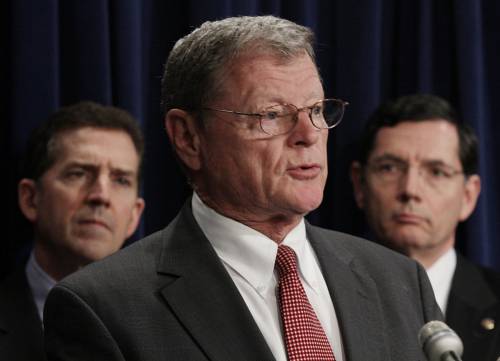Can Green Industry Save the Economy?
As lawmakers mull another economic stimulus, green industries could be key. With the economy in turmoil and oil prices in dramatic flux, many experts argue the best way to tackle these problems is an enormous federal investment in renewable technologies.
Jul 31, 2020968 Shares484.1K Views
Sen. Jim Inhofe has called global warming a "hoax." (WDCpix)
Can targeted federal investments in green energies and technologies create jobs and pull the United States out of its current economic funk?
That’s the message coming from a growing number of economists and Washington policymakers, who are urging Congress to make green investments a focus of legislation — expected to be debated next month — that would inject hundreds of billions of dollars into the flailing economy. Not only would such investments, as part of of a new stimulus package, boost jobs and drive development in the short-term, these experts say, but they would go a long way to make the United States more competitive in the decades to come.
Illustration by:Matt Mahurin
The issue has been a thorny one in Washington, where many Republicans — and a few well-placed Democrats — view environmental protectionism as a threat to economic progress. Indeed, the Bush administration has been a leading proponent of this theory. In 2008 alone, the White House has pushed efforts to expand offshore oil drilling, tap Western oil-shalereserves and permit mountain-top minersto destroy miles of valley streams — all done to relieve burdens on various traditional industries.
But now — with the economy in turmoil, oil prices in dramatic flux and lawmakers coming to accept the realities of the global warming crisis — many experts argue that the best way to tackle these problems is with an enormous federal investment in green industries. That transition would not only wean the country from an addiction to filthy fossil fuels, it would cut now-vital oil imports from the volatile Middle East. An increasing number of experts contend that the environmental-technology industry will be the next big boom, creating enormous economic growth for those countries at its forward edge. As lawmakers mull another economic stimulus package, these sources say, renewable technologies should be central to any plan they develop.
Energy efficiency projects, like retrofitting existing buildings, would be a good place to start, according to Robert Pollin, an economist at the University of Massachusetts, Amherst. He pointed out that those projects can begin immediately, helping the nearly 400,000 construction workers estimatedto have lost their jobs in the last year.
“The first priority for now, in terms of short-term big kick in the energy area, is energy efficiency,” Pollin told the House Education and Labor Committeelast Friday. “You’ll get the most jobs. It’ll be done fast. The technologies are there. And you will fight global warming. You will increase energy independence. You will create a lever against future rises in the price of oil.”
Daniel C. Esty, an environmental economist at Yale Law School, agreed, saying there are enormous opportunities to outfit old structures with better windows, insulations, water heaters and other technologies. “There’s an economic logic in improving energy efficiency in almost every building in America,” Esty said.
According to Pollin’s analysis, every $1 million invested in the green sector would create 16.7 domestic jobs. By contrast, Pollin found, the same $1 million in tax cuts returns 14.0 jobs; for military programs the return is 11.0 jobs, and for oil and natural gas development the figure drops to 4.4 jobs.
The reason for the sharp disparities, Pollin said, is two-fold. First, green businesses tend to be more labor intensive than most other industries. And second, the money tends to stay in the country, as opposed to moving abroad for outsourced services and imported goods.
Environmentalists hope that message reverberates in Washington. “For a long time, people on the right made it seem like environmental protection and job creation were competing objectives,” said Nick Berning, spokesman for Friends of the Earth, an environmental group. “It’s just not true.”
Slowly, this message is sinking in. At the start of this month, as part of its $700-billion bank bailout, Congress extendedpopular tax breaks on renewable energies like wind and solar. Still, many economists — including Federal Reserve Chairman Ben Bernanke — agree that, despite the bailout effort to get the banks lending again, Washington should provide another Main Street infusion to create jobs and prop up states struggling with budget shortfalls.
Ron Blackwell, chief economist at the AFL-CIO, argues that an effective stimulus bill would have to be in the $300-billion range. “If housing prices continue to fall like the way they’re falling,” he said, “[and] people continue to lose the jobs the way they’re doing, then all of the effort that Congress made to stabilize our credit markets by committing this [bailout] money will be lost.”
Last month, House Democrats passed a $58-billion spending packagecontaining a number of provisions to increase green-industry funding. Senate Republicans killed the measure, which the White House had threatened to veto in any case. Most of the GOP opposition, though, was directed at other provisions, including new funding for infrastructure projects and state Medicaid programs.
With the economy still in trouble, Democratic leaders stress the urgency of returning to some new stimulus bill. “It’s clear that it has to be done,” said Rep. George Miller (D-Cal.), chairman of the House Education and Labor Committee, “and it’s going to be done by the Congress in relatively short order.”
Upper-chamber Democrats are pushing for green investments as well. In a speech from the campaign trail Tuesday, Sen. John Kerry (D-Mass.) blasted the Bush administration for “years of denial and delay” on the green economy front — a delay allowing countries in both Europe and Asia to take the lead on environmental innovations.
“There are 750,000 green jobs in the U.S. today,” Kerry said. “In 30 years we can have six times that many. The choice is simple: we can be left behind, or we can lead.”
Yet Congress shares responsibility for the country’s slow adaption to green-industry trends. For decades, for example, the Michigan delegation, led by 27-term Rep. John Dingell (D), defeated effortsto increase Detroit’s fuel economy standards. This week, the Bush administration announcedthat it may use some of the $700 billion bailout to help the Big Three automakers, who are failing, largely from business plans that focused on gas-guzzling SUVs. Meanwhile, as climate change became more pronounced in recent years, the Senate’s most powerful voice on the environment for much of the last decade was James Inhofe (R-Okl.), a conservative who says global warming is “a hoax.”
Still, the green-economy push, once limited to environmentalist circles, is reaching wider audiences. Perhaps most prominent, New York Times columnist Thomas L. Friedman has evolved into one of the country’s loudest proponents for green investments. “When this bailout is over,” Friedman wrote on Sept. 28, “we need the next president — this one is wasted — to launch an E.T., energy technology, revolution with the same urgency as this bailout. Otherwise, all we will have done is bought ourselves a respite, but not a future.”
There is increasing evidence that Congress must step in with a stimulus plan. The nation’s unemployment rate is 6.1 percent — up 1.2 percent since January — and many experts expect that number to rise to at least 8 percent by the end of next year. Housing prices have plunged 20 percent from their peak, and are expected to fall another 10-15 percent in coming months. Home equity has evaporated with the sinking housing market, leading to a slump in retail sales. Home foreclosures are up 71 percent from a year ago. And consumer confidence is at its lowest pointsince records have been kept.
Democrats still hope to pass their stimulus bill when they return to Washington for a lame duck session after the elections. Those efforts seemed to get a boost Monday, when House Speaker Nancy Pelosi (D-Cal.) announcedthat President George W. Bush has voiced willingness to compromise on legislation. “Now we must find what is both fiscally responsible and politically possible,” Pelosi said.
But if Friday’s House hearing was any indication, that might be tougher than she hopes. No Republican even bothered to show up.
Rep. Barney Frank (D-Mass.) recently saidthat Democrats would be willing to delay the legislation until January rather than settle for a weak bill. With both unemployment and foreclosure rates on the rise, however, lawmakers might not have the luxury of postponement. Indeed, experts are warning that time is of the essence — both for the economy and the environment.
“The green sector is the future of this economy,” Pollin said. “We may not have any future unless we build that green sector starting now.”

Hajra Shannon
Reviewer
Latest Articles
Popular Articles

